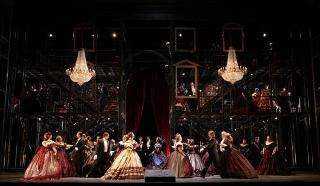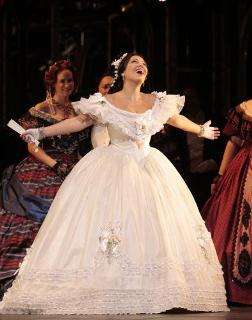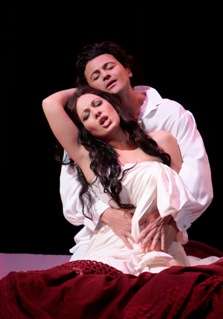|
Back
A Deadly Slow Roméo Los Angeles
Dorothy Chandler Pavilion
11/06/2011 - and 9, 12, 17, 20, 26 November 2011
Charles Gounod: Roméo et Juliette
Nino Machaidze (Juliette), Vittorio Grigolo (Roméo), Museop Kim (Mercutio), Alexey Sayapin (Tybalt), Vitalij Kowaljow (Frère Laurent), Renée Rapier (Stéphano), Vladimir Chernov (Le comte Capulet), Michael Dean (Grégorio), Ronnita Nicole Miller (Gertrude), Ben Bliss (Benvolio), Philip Cokorinos (Le Duc de Vérone), Daniel Armstrong (Le comte Pâris), Erik Anstine (Frère Jean)
Los Angeles Opera Orchestra and Chorus, Roberto Cani (Concertmaster), Grant Gershon (Assistant Conductor/Chorus Master), Plácido Domingo (Conductor)
Ian Judge (Director), John Gunter (Scenic Designer), Tim Goodchild (Costume Designer), Nigel Levings (Lighting Designer), Kitty McNamee (Choreographer), Ed Douglas (Fight Choreographer)

(© Robert Millard)
After the successful opening of Faust in 1859, Charles Gounod’s subsequent compositions garnered a checkered response. By failing to please the public with his five-act opera La Reine de Saba (1862) and an initial tepid reaction to his provincial Mireille (1864) could very well have led to an end of his career in this field. But Gounod was exonerated with the premiere of Roméo et Juliette at the Théâtre-Lyrique on April 27, 1867. Though not as popular as Faust, Roméo et Juliette, nevertheless, has recently seen a resurgence of productions within The United States.
Los Angeles Opera’s revival of the 2005 original production (Read here) features the returning triumvirate of Ian Judge, John Gunter and Tim Goodchild. Virtually identical, it contains Gunter’s ingenious metal framework that moves quickly and efficiently (though at times noisily) to meet the complex demands of set changes. The noticeable difference is that Gunter beautifully sharpens the scenes by adding more props to enliven the setting which allows deeper accentuation in Goodchild’s costuming. Altogether, Ian Judge’s direction has a more insipid approach than the 2005 rendition.

(© Robert Millard)
After a resounding Fiorilla in Rossini’s Il Turco in Italia Nino Machaidze returns in the role of Juliet. Having personally reviewed her in the 2008 Salzburg Grammophon DVD (Read here) release, Ms. Machaidze has, indeed, matured and possesses an even greater sophistication. Her dusky, powerful, steel-edged voice handles the gyrations in her valse-ariette, “Je veux vivre”, with graceful dexterity while, on the other hand, she sings with dramatic intensity and palpable poignancy in the “balcony scene.”

(© Robert Millard)
Making his LA Opera debut in the role of Roméo is tenor sensation Vittorio Grigolo. There’s been quite a buzz in the operatic circles since his Covent Garden debut in Manon with Ana Netrebko. But Mr. Grigolo has a slow start for when he first sets eyes upon Juliet, the attraction isn’t demonstratively convincing, and it’s only accentuated by Plácido Domingo’s lifeless and languishing tempo. This aberrance changes suddenly, and Grigolo overcompensates, morphing into a quasi-catatonic state. Perhaps attributed to an operatic debut or stage fright, the transformation is, nonetheless, gratifying and pulsating even though his Romeo is “rough around the edges.” For the remainder of the opera this spark continues to burn with Ms. Machaidze. His handsome good looks and chiseled physique help add to his impassioned intensity and unveiling emotions. The pairing between the two lovers is satisfying.
Pacing in this Roméo et Juliette is excruciatingly torpid under the baton of Plácido Domingo; the orchestra lacks any zip; the chorus scenes appear dull and lackluster, particularly in the Capulet ballroom scene. Pockets of dramatic intensity DO exist within specific characters (specifically Roméo and Juliet), but overall the frisson is rather empty. Despite Ed Douglas’ sufficient fight choreography, the umbrella choreography of Kitty McNamee is uninspiring and artificially contrived.
Vitalij Kowaljow’s deep bass register has heft and authoritative quality, and he sings a beautifully dramatic “Buvez donc ce breuvage.” Ronnita Nicole Miller’s soft and conservatively comforting voice makes a wonderful Gertrude. A last minute replacement, Renée Rapier fills in as Stéphano. There’s a delightful lilt about her “Que fais-tu, blanche tourterelle”, but what’s missing is any sort of swaggering and impish delight. Museop Kim’s Mercutio shows certain signs of exhilarative qualities, though his Queen Mab aria is uneventful. Musically speaking, Grant Gershon’s chorus once again does an excellent job.
The oft-omitted arias “Dieu! Quel frisson court dans mes veines” and the dramatic air, “Amour ranime mon courage” are included. Gounod’s ballet music no. 3 is included as well as the rarely heard “Epithalamium” (nuptial hymn); the orchestral interlude of Act V, “Le sommeil de Juliette”, is omitted. The aforementioned acts are “assumed” for the program melds the Gounod opera into one continuum with no decisive delineations.
Only one intermission is included in this production, making the first half of the opera clocking in at just under two hours...way too long (even longer than Wagner’s Das Rheingold.) Maybe it’s to reduce expenses (due to the previous drain by Freyer’s Ring), but this factor only adds to making this a dead slow Roméo.
Christie Grimstad
|